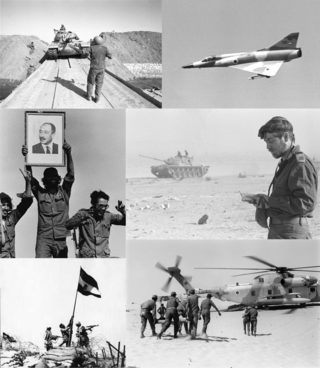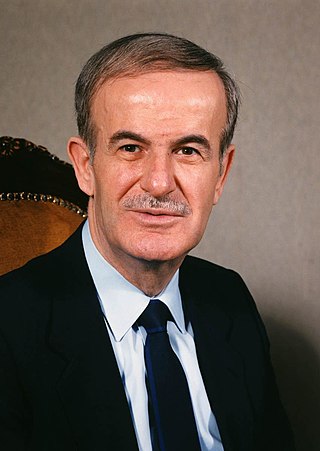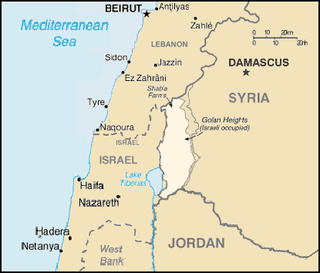Related Research Articles

Damascus is the capital of Syria, the oldest capital in the world and, according to some, the fourth holiest city in Islam. Known colloquially in Syria as aš-Šām (الشَّام) and dubbed, poetically, the "City of Jasmine", Damascus is a major cultural center of the Levant and the Arab world.

The Levant is an approximate historical geographical term referring to a large area in the Eastern Mediterranean region of Western Asia. In its narrowest sense, which is in use today in archaeology and other cultural contexts, it is equivalent to a stretch of land bordering the Mediterranean in southwestern Asia, i.e. the historical region of Syria, which includes present-day Israel, Jordan, Lebanon, Palestine, Syria and most of Turkey southwest of the middle Euphrates. Its overwhelming characteristic is that it represents the land bridge between Africa and Eurasia. In its widest historical sense, the Levant included all of the Eastern Mediterranean with its islands; that is, it included all of the countries along the Eastern Mediterranean shores, extending from Greece to Cyrenaica in eastern Libya.

The Yom Kippur War, also known as the Ramadan War, the October War, the 1973 Arab–Israeli War, or the Fourth Arab–Israeli War, was an armed conflict fought from October 6 to 25, 1973 between Israel and a coalition of Arab states led by Egypt and Syria. The majority of combat between the two sides took place in the Sinai Peninsula and the Golan Heights—both of which were occupied by Israel in 1967—with some fighting in African Egypt and northern Israel. Egypt's initial objective in the war was to seize a foothold on the eastern bank of the Suez Canal and subsequently leverage these gains to negotiate the return of the rest of the Israeli-occupied Sinai Peninsula.

The United Arab Republic, or simply the Arab Republic or Arabia, was a sovereign state in the Middle East from 1958 until 1971. It was initially a political union between Egypt and Syria from 1958 until Syria seceded from the union following the 1961 Syrian coup d'état. Egypt continued to be known officially as the United Arab Republic until 1971.

Hafez al-Assad was a Syrian statesman and military officer who served as President of Syria from taking power in 1971 until his death in 2000. He was also Prime Minister of Syria from 1970 to 1971, as well as regional secretary of the regional command of the Syrian regional branch of the Arab Socialist Ba'ath Party and secretary general of the National Command of the Ba'ath Party from 1970 to 2000. Hafez al-Assad was a key participant in the 1963 Syrian coup d'état which brought the Syrian regional branch of the Arab Socialist Ba'ath Party to power in the country.

Bashar Hafez al-Assad is a Syrian politician who has served as the 19th president of Syria since 17 July 2000. In addition, he is the commander-in-chief of the Syrian Armed Forces and the secretary-general of the Central Command of the Arab Socialist Ba'ath Party, which nominally espouses a neo-Ba'athist ideology. His father and predecessor was General Hafez al-Assad, whose presidency between 1971 and 2000 marked the transfiguration of Syria from a republican state into a dynastic dictatorship tightly controlled by an Alawite-dominated elite composed of the armed forces and the Mukhabarat, who are loyal to the Assad family.

Hatay Province is the southernmost province of Turkey. It is situated mostly outside Anatolia, along the eastern coast of the Levantine Sea. The province borders Syria to its south and east, the Turkish province of Adana to the northwest, Osmaniye to the north, and Gaziantep to the northeast. It is partially in Çukurova, a large fertile plain along Cilicia. Its administrative capital is Antakya, making it one of the three Turkish provinces not named after its administrative capital or any settlement. The second-largest city is İskenderun. Sovereignty over most of the province remains disputed with neighbouring Syria, which claims that the province had a demographic Arab majority, and was separated from itself against the stipulations of the French Mandate of Syria in the years following Syria's occupation by France after World War I.

The Alawites, or pejoratively Nusayris, are an Arab ethnoreligious group that lives primarily in the Levant and follows Alawism, a sect of Islam that originated from Shia Islam. The Alawites venerate Ali ibn Abi Talib, revered as the first Imam in the Twelver school, as the physical manifestation of God. The group is believed to have been founded by Ibn Nusayr during the 9th century. Ibn Nusayr was a disciple of the tenth Twelver Imam, Ali al-Hadi and of the eleventh Twelver Imam, Hasan al-Askari. For this reason, Alawites are also called Nusayris.

Syria, officially the Syrian Arab Republic, is a Western Asian country located in the Eastern Mediterranean and the Levant. It is a unitary republic that consists of 14 governorates (subdivisions), and is bordered by the Mediterranean Sea to the west, Turkey to the north, Iraq to the east and southeast, Jordan to the south, and Israel and Lebanon to the southwest. Cyprus lies to the west across the Mediterranean Sea. A country of fertile plains, high mountains, and deserts, Syria is home to diverse ethnic and religious groups, including the majority Syrian Arabs, Kurds, Turkmens, Assyrians, Circassians, Armenians, Albanians, Greeks, and Chechens. Religious groups include Muslims, Christians, Alawites, Druze, and Yazidis. The capital and largest city of Syria is Damascus. Arabs are the largest ethnic group, and Sunni Muslims are the largest religious group. Syria is the only country that is governed by Ba'athists, who advocate Arab socialism and Arab nationalism. Syria is a member of the Non-Aligned Movement and the Arab League.

The Golan Heights, or simply the Golan, is a region in the Levant spanning about 1,800 km2 (690 sq mi). The region defined as the Golan Heights differs between disciplines: as a geological and biogeographical region, the term refers to a basaltic plateau bordered by the Yarmouk River in the south, the Sea of Galilee and Hula Valley in the west, the Anti-Lebanon with Mount Hermon in the north and Wadi Raqqad in the east. As a geopolitical region, it refers to the border region captured from Syria by Israel during the Six-Day War of 1967; the territory has been occupied by the latter since then and was subject to a de facto Israeli annexation in 1981. This region includes the western two-thirds of the geological Golan Heights and the Israeli-occupied part of Mount Hermon.

Syrians are the majority inhabitants of Syria, who share common Levantine roots. The cultural and linguistic heritage of the Syrian people is a blend of both indigenous elements and the foreign cultures that have come to rule the land and its people over the course of thousands of years. The mother tongue of most Syrians is Arabic, especially its Levantine dialect. By the seventh century, most of the inhabitants of the Levant spoke Aramaic. In the aftermath of the Muslim conquest of the Levant in 634, Arabic became the dominant language, but a minority of Syrians retained Aramaic, which is still spoken in its Syriac and Western dialects.

The Islamic State (IS), also known as the Islamic State of Iraq and the Levant, Islamic State of Iraq and Syria, and by its Arabic acronym Da'ish or Daesh, is a militant Islamist group and former unrecognized quasi-state that follows the Salafi jihadist branch of Sunni Islam. It was founded by Abu Musab al-Zarqawi in 1999 and gained global prominence in 2014, when it drove Iraqi security forces out of key cities during the Anbar campaign, which was followed by its capture of Mosul and the Sinjar massacre. The organization significantly revamped the course of the Syrian civil war when it announced its expansion into Syria in mid-2013 and began conducting ground attacks against both Syrian government forces and Syrian opposition militias. By the end of 2015, it held an area that contained an estimated eight to twelve million people and stretched from western Iraq to eastern Syria, where it enforced its interpretation of Islamic law. ISIL was estimated at the time to have an annual budget of more than US$1 billion and more than 30,000 fighters.

The Syrian civil war is an ongoing multi-sided civil war in Syria fought between the Syrian Arab Republic led by Syrian president Bashar al-Assad and various domestic and foreign forces that oppose both the Syrian government and each other, in varying combinations.

The Free Syrian Army (FSA) is a big-tent coalition of decentralized resistance militias in the Syrian Civil War founded on 29 July 2011 by Colonel Riad al-Asaad and six officers who defected from the Syrian Armed Forces. The officers announced that the immediate priority of the Free Syrian Army is to safeguard the lives of protestors and civilians from the deadly crackdown by Bashar al-Assad's security apparatus; with the ultimate goal of accomplishing the objectives of the Syrian revolution, namely, the end to the decades-long reign of the ruling al-Assad family. In late 2011, the FSA was the main Syrian military defectors group. Initially a formal military organization at its founding, its original command structure dissipated by 2016, and the FSA identity has since been used by various Syrian opposition groups.

The Syrian opposition is the political structure represented by the Syrian National Coalition and associated Syrian anti-Assad groups with certain territorial control as an alternative Syrian government.

The Autonomous Administration of North and East Syria (AANES), also known as Rojava, is a de facto autonomous region in northeastern Syria. It consists of self-governing sub-regions in the areas of Afrin, Jazira, Euphrates, Raqqa, Tabqa, Manbij, and Deir Ez-Zor. The region gained its de facto autonomy in 2012 in the context of the ongoing Rojava conflict and the wider Syrian Civil War, in which its official military force, the Syrian Democratic Forces (SDF), has taken part.

The American-led intervention in the Syrian Civil War refers to the American-led support of Syrian rebels and the Syrian Democratic Forces (SDF) during the course of the Syrian civil war, including Operation Inherent Resolve, the active military operation led by the United States, and involving the militaries of the United Kingdom, France, Jordan, Turkey, Canada, Australia, and others against the Islamic State (IS) and al-Nusra Front since 2014. Beginning in 2017–18, the U.S. and its partners have also targeted the Syrian government and its allies via airstrikes and aircraft shoot-downs, mainly in defense of either the SDF or the Revolutionary Commando Army opposition group based in al-Tanf.

The Russian military intervention in the Syrian civil war began in September 2015, after a request by the Syrian government for military aid against rebel and jihadist groups. The intervention initially involved air strikes by Russian aircraft from the Khmeimim base against targets primarily in north-western Syria, and against Syrian opposition militant groups opposed to the Syrian government, including the Free Syrian Army, the Islamic State of Iraq and the Levant (ISIL), al-Nusra Front and the Army of Conquest. Russian special operations forces, military advisors and private military contractors like the Wagner Group were also sent to Syria to support the Assad regime, which was on the verge of collapse. Prior to the intervention, Russian involvement in the Syrian Civil War had mainly consisted of supplying the Syrian Army with arms and equipment. At the end of December 2017, the Russian government announced that its troops would be deployed to Syria permanently.

The Syrian Democratic Forces (SDF) is a coalition of ethnic militias and rebel groups in North and East Syria (AANES). An alliance of forces formed during the Syrian civil war composed primarily of Kurdish, Arab, and Assyrian/Syriac, as well as some smaller Armenian, Turkmen and Chechen forces. It is militarily led by the People's Protection Units (YPG), a Kurdish militia recognized as a terrorist group by Turkey. SDF also includes several ethnic militias, and various factions of the Syrian opposition's Free Syrian Army. Founded in October 2015, the SDF states its mission as fighting to create a secular, democratic and federalised Syria. According to Turkey, the Syrian Democratic Forces has direct links to the PKK.

The Battle of Khasham, also known as the Battle of Conoco Fields, was a military engagement of the Syrian civil war fought on 7 February 2018 near the towns of Khasham and Al Tabiyeh in the Deir ez-Zor Governorate, Syria. The Operation Inherent Resolve coalition delivered air and artillery strikes on Syrian Armed Forces and pro-government militias after they reportedly engaged a U.S. military and Syrian Democratic Forces (SDF) position in the region.
